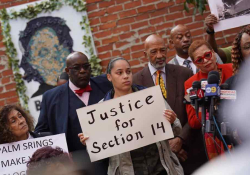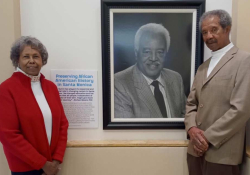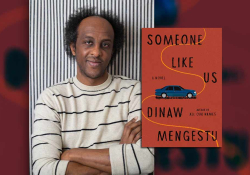Juan Villoro (b. 1956, Mexico City) is a novelist, short-story writer, essayist, and chronicler whose work addresses an impressive array of topics with insight, dark humor, and irony: canonical Mexican literature; the Zapatista insurrection in Chiapas; the legacy of Mexico’s Cristero War; the intersections of popular television and fiction genres; and the social and cultural functions of spectator sports like boxing and soccer. A remarkably versatile writer, both in terms of subject matter and genre, Villoro also stands out for his insistently reflective style. His discussion of an issue is also an appraisal, often subtly executed, ofhow that issue should be or traditionally has been treated.
Villoro has won a number of awards, including the Herralde Prize for his novel El testigo (2004). He has published more than seventeen books, including the novels El disparo de argón (1991) and Materias dispuestas (1997); the short-story collections El mariscal de campo (1978) and La casa pierde (1999); the collections of chronicles Tiempo transcurrido (1986) and Las once de la tribu (1995); essay collections, including the recent work De eso se trata (2008); and literature for children like the short novel El profesor Zíper y la fabulosa guitarra eléctrica (1992). When I had the opportunity to speak with Vi-lloro, our conversation covered a lot of ground, from the serious nature of soccer fandom to the importance of keeping one’s sense of humor.
Ryan Long: You have written a great deal about sports in your career, and I was wondering to what extent you can compare writing to watching or playing sports. For example, in Las once de la tribu, about soccer, you focus on the space of the playing field and how time passes there. How do sports and spaces where sports are played help you think about literature?
Juan Villoro: What interests me about sports, not as a fan but as a writer, is that sports represent an articulated form of passion. By looking at sport, we can understand behaviors that relate to how we express and give in to our emotions in contemporary society. I’m especially interested in fandom when it comes to soccer. Instead of chronicling what happens on the field, I’m more interested in investigating why what happens there becomes something that interests so many people, that lets loose superstitions, systems of belief, hopes, disappointments, rivalries, and so on. All of the representational power and fantasies that the game produces, that’s what captivates me as a narrator, as a literary witness. Of course as a fan it’s different: I just want my team to win.
RL: Fans affiliated with soccer teams tend to be different from the protagonists of your novels, like Fernando Balmes in El disparo de argón or Julio Valdivieso in El testigo. These are very solitary figures, aren’t they?
JV: Yes, they’re the opposite of a soccer fan—cut off, melancholic, really passive—and it seems like not much happens to them. They don’t have a predisposition to be happy or joyful. So at first they’re relatively opaque, but from this weakness, from this fragility, they understand key aspects of the world that are not accessible to those who play a central role in the realms of life and action.
RL: They’re witnesses, filters of their own experience.
JV: In El testigo, yes, I was very interested in asking, Who is the best literary witness of an event? From a judicial point of view, there are conditions determining what one can say in a courtroom. But from a moral, psychological, and literary point of view, the subjective process that makes someone a good witness is much more complex. So El testigo is about the formation of the figure of the witness and to what extent the witness influences what he sees. I do not believe that any witness is completely passive or apathetic. Inevitably, the witness participates in the experiment of looking. But the attitude of the protagonist in El testigo is very different from the one I have when I watch soccer, which is a much noisier, celebratory, and unrestrained attitude.
RL: So, it’s a question of distance, too.
JV: Exactly. And when I write a novel in which the characters are unique and a little distanced from the reality in which they find themselves, when they’re actually uncomfortable in that reality, what I am looking for is a personal, individual voice. By contrast, in soccer I look for the voice of the tribe, the collective voice, the contemporary Greek chorus that expresses itself in a stadium.
RL: How does the relationship between the collective and the individual function in El testigo? I’m thinking, for example, of a particularly striking scene in that novel in which the protagonist looks over the “battalion of the fallen,” which is a place in the middle of nowhere populated by the shirts of dead Cristeros. Clearly this novel is about national identity, a nearly exhausted but important theme. In the novel, is there an image of the collective that still works?
JV: Well, it’s a broken collective, whose ruptured nature is explained by its relationship to a very specific moment of Mexico’s history: the end of the government of the Institutional Revolutionary Party (pri), which was in power for seventy-one years. This moment also coincides with the end of my protagonist’s exile. The Mexican in my novel, for a very personal reason, has lived in Paris for twenty-four years before returning to Mexico. So the novel tells the story of the end of an era in personal terms—the character who returns to his country—and the end of an era in national terms—the first democratic alternation of power. But this alternation is more of a rupture than a continuity, because a conservative party comes to power with a spirit of vindication defined by Catholic conservative ideas that predate even the Revolution of 1910–20. My protagonist finds himself in a country that is at once his and not his. This is why he becomes a witness, because it’s so hard for him to participate in public life, to reintegrate himself with his people, his family, and his society. He realizes that the so-called step forward for Mexico is in reality the opportunity to settle old scores. All sorts of skeletons start coming out of the closet, and he finds himself in a country that he fails to understand.
In the novel, I venture that the conservative party in power was going to be connected to the restoration of a moral order that we thought had been relegated to the past—the moral order of the Catholic Church, restrictions on some individual freedoms, and so on. And at the same time I depict—and this I really underestimated—social disintegration at the moment that the established order is lost. The order of impunity that defined the old authoritarian party, the PRI, not having been replaced with another order, helped create a chaotic context in which organized crime finds fantastic opportunities. The new powers that be are television, soap operas, narcotrafficking, and fanaticism. Sadly, since Mexican reality is truly hyperbolic, all of these tendencies are much more pronounced in real life than in my novel, El testigo.
RL: Yes, in the novel there’s a fascinating story recounting how television producers fight with narcotraffickers over where to film a soap opera about the Cristero War, a plot that’s clearly a reflection on national space and its fractured state. Space is a predominant theme in your work, and in one of your literary critical essays, in De eso se trata, you cite Robert Musil to confirm that, for you, literature is always extra-territorial. Why do you believe that?
JV: Well, the territory constructed in a work of literature may refer to a concrete place, but it is not subject to its geographical, political, or cultural coordinates. The symbolic creation of a given space is a process of converting a geographical domain into a representational domain. The latter may look like the real place to which it corresponds, but it has a life of its own. Writing is a process of inventive subtraction. So James Joyce writes the great novel of Dublin that is at the same time about a very different, imaginary Dublin. It’s not the charting of Dublin itself. It captures instead zones of subjective intensity that correspond more to what’s going on in Joyce’s mind than to what actually happens in Dublin. Literary space is always the product of the imaginary usage of an actual space.
RL: Almost every year I teach a survey of twentieth-century Latin American literature. One author my students tend to like a lot is Augusto Monterroso. Didn’t you take a course with him? Is there a moment or lesson from that course you remember particularly well?
JV: Yes, I was in a workshop with him, and I remember that Monterroso was a very strict teacher who put a lot of emphasis on the details of writing. He was a great humorist, but he was also very interested in literary details. For example, one really interesting thing I remember is his insistence that writers add, on purpose, mistakes to their texts, some kind of dissonance, a minor moment of deliberate carelessness to give the text a sense of naturalness. Naturalness is one of the hardest things to achieve in a literary text. It’s obviously an illusion because writing is artifice. Even if you write in colloquial language, even if you want to present things very simply, it’s still artifice. So he always urged us to include, unexpectedly, and very much on purpose, some error having to do with some detail—the use of commas, word choice, redundancy—to make the text seem more natural. This effective use of error is crucial for Monterroso.
He also reminded us that, in its literature, Mexico doesn’t have a strong tradition of humor. One of the big problems of our literature is that it’s so solemn. We have great books, but almost all of them are, let’s say, very serious. In contrast to the English-language literary tradition, wit, humor, and satire haven’t been cultivated enough, though there are very important exceptions, like Monsiváis and Ibargüengoitia. Monterroso always told us, “The true role of the humorist is to make the readers think and even laugh.” In other words, he made an important distinction between just being funny and turning humor into something that showed readers typical things in an atypical way, teaching them to see what they hadn’t seen before, but where they’d always been looking.
RL: You definitely cultivate a sense of humor in your writing. While reading El testigo I could barely stop laughing after I read the diatribe against the band Supertramp. Why did the protagonist, Valdivieso, hate Supertramp so much?
JV: I wanted to explore the psychological displacement taking place in a character who doesn’t want to face up to the mistakes he made in the past. Remember, he plagiarized his thesis. The shame he feels about it is like a wound that’s never going to heal. And when we do something that offends ourselves, that makes us feel ashamed, instead of assuming 100 percent of the responsibility, we transfer our feelings to something else. Due to random circumstances, Valdivieso remembered his plagiarism every time he listened to Supertramp. So, instead of hating himself, he decides to hate Supertramp as a means of compensation.
But why Supertramp in particular? Well I needed a band I could criticize with abandon. I like Supertramp. When I was a DJ I played Supertramp. I even saw them once in Berlin. They’re not my favorite, but I like them. But they’re a group that, in the first place, is not really in the big leagues. Taking on the Rolling Stones, for example, is complicated. I would have had to bring in the heavy artillery in order to demythify the Stones, the Beatles, Jimi Hendrix, or the Doors, you know, the legendary bands. I needed a lesser band. Second, they’re really derivative, without a defined personal style. And they’ve got those nasal voices. Supertramp is a band you can make fun of pretty easily—the perfect rival for Valdivieso.
RL: So Supertramp reminds Valdivieso of his past, which continues to affect him throughout the novel. And an interesting thing about his story is that he is more disturbed by what he hasn’t done than by what he has.
JV: Yes, I am very interested in what you might call the weight of absence, the burden of that which never happened but which still affects you. El testigo is really shaped by this idea, particularly in the case of Valdivieso, who was unable to travel to Europe with the woman he loved because they confused their meeting place. He thought she had abandoned him, but her standing him up was actually an accident. So for the rest of his life Valdivieso was the-person-who-didn’t-go-with-her. Things like this happen to us all the time. For example, if you go and live in Oklahoma, you become the-person-who-did-not-go-to-Texas. Cancellations, things that are decided against, weigh on us in mysterious ways. As a writer, I ask to what degree we can understand ourselves by what hasn’t happened to us. This question intrigues me because if something hasn’t happened, it can’t really be narrated. Nevertheless, it still affects us.
Another aspect of this phenomenon that interests me is applying retroactive logic to chance, or accidents. It doesn’t interest me in the same way that it might interest, say, Paul Auster, who obsessively creates moments of chance in order to develop their possible conclusions. I’m more interested in how we apply causes retroactively in such a way that something that at first doesn’t make sense suddenly seems reasonable, but only based on events that follow it.
In El testigo, the protagonist continues living his life, but as someone obsessed with finding the cause that can explain why his lover left him. He suffers the burden of absence and, on the other hand, the burden of explaining chance. I suppose that in the end we all want there to be no accidents; we want to abolish chance. I think that telling stories based on what doesn’t happen is an interesting challenge, a challenge related to what happens in my stories and that I face as a writer of those stories.
May 2010
Translation from the Spanish
By Ryan F. Long











